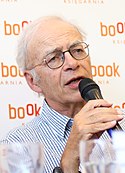Peter Singer Quote
Suppose that we believe that in 200 years, people would be prepared to pay a million dollars (that's in today's dollars, not inflated ones) to be able to have an unspoilt valley. Now imagine that today we can profit by cutting down the forest in the valley, which will never regrow. If we apply an annual discount rate of 5 percent, compounded exponentially, how big would that profit have to be to justify the loss of a million dollars in 2210? The answer, surprisingly, is just sixty dollars! That's all that a million dollars in 200 years is worth, at that rate of discount. Obviously, then, if we use a 5 percent discount rate, values gained one thousand years in the future scarcely count at all. This is not because of any uncertainty about whether there will be human beings or other sentient creatures inhabiting this planet at that time, but merely because of the compounding effect of the rate of return on money invested now.
Suppose that we believe that in 200 years, people would be prepared to pay a million dollars (that's in today's dollars, not inflated ones) to be able to have an unspoilt valley. Now imagine that today we can profit by cutting down the forest in the valley, which will never regrow. If we apply an annual discount rate of 5 percent, compounded exponentially, how big would that profit have to be to justify the loss of a million dollars in 2210? The answer, surprisingly, is just sixty dollars! That's all that a million dollars in 200 years is worth, at that rate of discount. Obviously, then, if we use a 5 percent discount rate, values gained one thousand years in the future scarcely count at all. This is not because of any uncertainty about whether there will be human beings or other sentient creatures inhabiting this planet at that time, but merely because of the compounding effect of the rate of return on money invested now.
Related Quotes
Most police cars are the equivalent of an electrical room on wheels and it does not surprise me that police officers that spend time in such a biologically toxic environment are displaying aggression.
About Peter Singer
On two occasions, Singer served as chair of the philosophy department at Monash University, where he founded its Centre for Human Bioethics. In 1996, he stood unsuccessfully as a Greens candidate for the Australian Senate. In 2004, Singer was recognised as the Australian Humanist of the Year by the Council of Australian Humanist Societies. In 2005, The Sydney Morning Herald placed him among Australia's ten most influential public intellectuals. Singer is a cofounder of Animals Australia and the founder of the non-profit organization The Life You Can Save.
